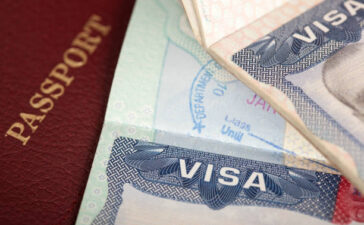Canada is a beautiful country that is a dreamland for nature lovers and explorers. It also takes care of its residents through social welfare programs. However, there are several ways to get Permanent Residency in Canada.
Advertisement
Permanent residents are eligible to sponsor their spouses, common-law partners, children, parents and grandparents for Canadian citizenship. They also have access to universal health care coverage.
1. Express Entry
The federal government manages the Express Entry program to recruit skilled workers to meet Canada’s labour market needs. It is a points-based system that assesses candidates’ profiles, known as the Comprehensive Ranking System (CRS), and invites those with the highest scores to apply for permanent residence in Canada through regular draws.
Candidates enter the Express Entry pool by submitting an online profile that answers questions about their age, education, work experience, language skills and other factors. Once a profile is entered, candidates receive a CRS score, and those with the top scores are invited to apply for Canadian permanent residence through an Invitation to Apply (ITA).
Applicants can increase their chances of scoring high by taking a language test and getting an Educational Credential Assessment (ECA) for any post-secondary education they’ve completed. Also, applicants can earn extra points if they have a spouse or partner who is applying as accompanying to them.
You can find out if you’re eligible for Express Entry by doing a self-assessment, or by using an immigration consultant to help you determine your eligibility. If you’re interested in finding a representative, be sure to check their credentials through IRCC’s Authorized Paid Representative Portal.
Advertisement
2. Federal Skilled Worker Program for Permanent Residency in Canada
If you have a higher level of education than is required for the Express Entry program and/or substantial foreign work experience, you may be eligible to apply under the Federal Skilled Worker (FSW) Program. This stream of the immigration system prioritizes applicants who will contribute to Canada’s economy and society.
This includes skilled tradespeople, managers and executives, and other professionals with the necessary skills to fill high-skilled jobs in Canada.
If your application is successful, you will receive a permanent resident visa. However, you must be able to support yourself and your family members when you settle in Canada. This is a requirement of all Canadian visa programs.
IRCC will assess your ability to do so by reviewing your financial records, including bank statements, brokerage accounts and other investments. You will need to demonstrate that you have enough money to live in Canada for at least two years. Also, you will need to provide proof that you can meet your medical and security requirements.
You can immigrate to Canada as a FSW if you have sufficient work experience, a job offer from a PEI employer and the right language skills. You must have a valid work permit in Canada.
In addition, you must score at least 67 points on the FSW selection grid, which allocates points for age, education, language, employment experience, arranged Canadian employment, and adaptability. You must also pass a medical exam and have a clean criminal record. Unlike Express Entry, you will not be penalized for not having a job offer in Canada.
If you are selected, you will receive a nomination certificate from the PEI PNP. This certificate will allow you to apply for permanent residency with IRCC. You will need to submit your complete Application for Permanent Residency along with your nomination certificate.
3. Provincial Nominee Program
Many Canadian provinces have their own Provincial Nominee Program (PNP) which allows them to select immigrants who can best fit their needs. This is especially helpful when a particular profession is in demand in a specific region, such as engineering, IT, nursing, and teaching.
It also allows provinces to select candidates with unique skills and expertise. If you are selected by a PNP stream, you will be invited to apply for permanent residency. The process is a little different from Express Entry.
First, you will need to meet the eligibility requirements of a provincial or territorial program. You can find this information on their websites or by visiting IRCC’s website for PNP eligibility. Some PNP streams require you to have a job offer, while others do not. After meeting all the requirements, you can then submit your application to that province or territory.
If you are selected, they will send a nomination letter to Immigration, Refugees and Citizenship Canada (IRCC). This is your invitation to apply for a permanent residence visa. Once you receive a nomination, you will need to submit the required documents to IRCC, including medical and security checks. You will also need to prove that you have sufficient funds to support yourself and your family after you move to Canada.
Most of the PNP programs are designed for skilled workers, but there are some that are specifically for post-graduate students and business owners. Some require you to have a job offer in the province, while others do not. The requirements vary widely, so it is important to research each province or territory’s PNP programs carefully.
4. Regional Nominee Program for Permanent Residency in Canada
The Provinces and territories can nominate immigrants to settle in Canada under their Provincial Nominee Program (PNP). Unlike the federal Express Entry system, PNP programs do not require applicants to have a job offer from a Canadian employer. Many of these programs have specific occupations that they are looking to fill.As well as regions of the country where they want to see more immigration.
For example, the Ontario Immigrant Nominee Program (OINP) is currently seeking highly skilled workers. Essentially for their Rural and Northern Economic Immigration Pilot. This program will nominate 100 people each year who meet the province’s labour market needs. And can demonstrate a strong commitment to the community they are moving to.
Similarly, the Saskatchewan Immigrant Nominee Program (SINP) is also open to those with the skills and education needed to succeed in their province’s labour market.
This program will select candidates with high Comprehensive Ranking System (CRS) scores through regular Express Entry draws, which take place about every two weeks. The top candidates will then be invited to apply for permanent residency with IRCC.
As a permanent resident, you will have the same rights and responsibilities as Canadian citizens. You will be able to live, work (with some restrictions), study and travel throughout the country. You will be eligible for many of the same social benefits that are available to all residents of Canada, including access to free healthcare.
Another benefit of becoming a permanent resident is that you are able to sponsor your spouse, children or parents to join you in Canada. In addition, you can apply to become a naturalized citizen after living in the country for three years.




